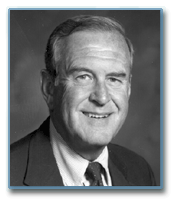
Author: The Office of Public Affairs
After Diana McGuire’s first child was born, her doctor told her she should not grow her family any further. Having had a kidney transplant and then one healthy baby was “enough.”
But when the young mother turned to James Scott, a professor of obstetrics and gynecology at the University of Utah, he had a very different answer—one that changed her life forever.
“I have a wonderful, beautiful life that is full and rich and the bulk of it is because Dr. Scott gave me the opportunity to be a mother,” said McGuire, who went on to have four more healthy children.
Repeatedly recognized over the years as one of the best doctors in the country, Scott, now 76, was honored in April by his colleagues with the Luella Klein Lifetime Achievement Award from the American Congress of Obstetricians and Gynecologists. Despite the recognition, he is humble about his success.
“I’m honored to have [the award] but I think there are plenty of others who deserve it,” he said.
His career spanned the country and evolved from general practitioner in a pre-ultra sound era to medical journal editor-in-chief. “Medicine has been my life,” Scott said recently.
He remembers how proud his parents were that he even went to college - the first in his family to do so. After growing up in Burlington, Iowa, Scott attended the University of Iowa for both undergraduate and doctor of medicine degrees.
For two years he was in general practice on a Hopi Indian reservation in Arizona, a time he remembers as perhaps the most service-oriented in his career.
“Those were days when there weren’t enough doctors around,” he said, recalling the high number of infant deaths at the hospital from infections and a condition known as “failure to thrive.” “It was more third world medicine.”
After nearly four years in general practice in rural Iowa, he completed a residency at the University of Iowa in obstetrics and gynecology that he describes as “almost a luxury to have time to think and do research.” It convinced him to stay in academic medicine.
That decision would lead to a reproductive immunology fellowship at the University of Texas at Dallas and then an academic appointment at the University of Iowa. He headed west permanently at 39 when he took over as chair at University of Utah’s Department of Obstetrics and Gynecology at the School of Medicine. After 18 years as chair, he would then become editor-in-chief of the premiere academic journal Obstetrics & Gynecology from 2001 to 2013.
That work was a significant reason his colleagues wanted to honor him, said Jeanne Conry, the outgoing president of the American Congress of Obstetricians and Gynecologists.
“Dr. Scott has been a leader in the field for so many years,” she said. “You look at his impact in maternal fetal health - it’s incredible.”
As editor, his decisions with his staff on what articles to run influenced doctors across the country.
“When you’re the editor-in-chief you set an example by how we evaluate research,” she said. “He did it with a very gentle humility and a strength.”
Having published eight books and more than 200 scientific papers, Scott continues to research and speak at teaching conferences. A recent talk was named “Don’t Believe Everything You Read,” about how medical literature can be misleading and how the media can be misleading in what it reports.
As a medical student, Matthew Peterson, now chairman of the Department of Obstetrics and Gynecology, watched Scott sit on the side of patients’ beds and talk with them about their problems.
“He would find out what things made a patient feel like they were cared for, they were understood and they were listened to,” he recalled. “Just doing that made us as students realize that is how you develop a relationship with a patient.”
Scott oversaw the growth of the University of Utah’s department “out of obscurity,” Peterson said, and built it into one of the top-tier residency programs and departments in the nation.
“We’re grateful we got to be part of the team he put together,” Peterson said.
Years after Diana McGuire came to see him about her family dreams, Scott continues to follow her children and those of other transplant patients around the world in a longterm research project. The study examines whether immunosuppressant drugs used in their mothers affected their daughters’ health, particularly their pregnancies.
McGuire, now a grandmother to 15, tears up when talking about Scott. He’s taken the time to stay in touch with her, the kind of attention people don’t normally receive from your average doctor.
“My joy in my life is most definitely my family and I just feel like it’s due to a doctor that trusted me and had faith in me and did everything medically he could do to see I had the family I wanted to have,” she said.